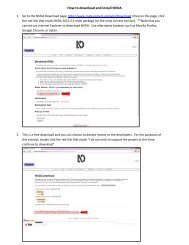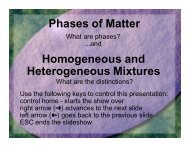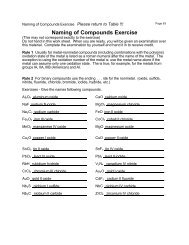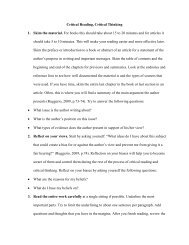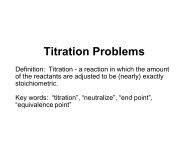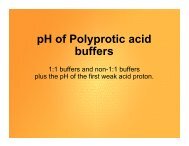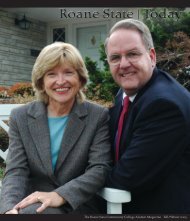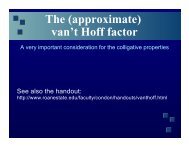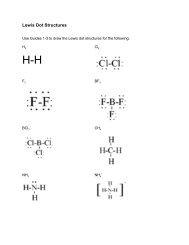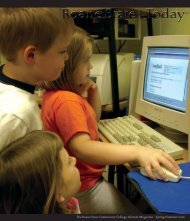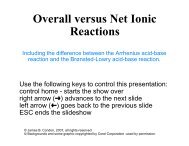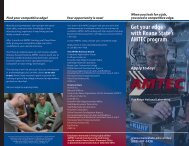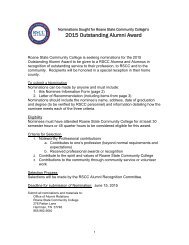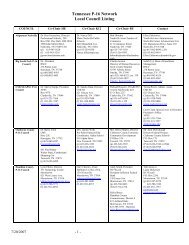2006-2008 Catalog - Roane State Community College
2006-2008 Catalog - Roane State Community College
2006-2008 Catalog - Roane State Community College
Create successful ePaper yourself
Turn your PDF publications into a flip-book with our unique Google optimized e-Paper software.
7111-<strong>Roane</strong>StCommColl 6/16/06 2:58 PM Page 252<br />
Course Descriptions<br />
252 ROANE STATE COMMUNITY COLLEGE<br />
DSPR 0800—Developmental Reading . . . . . . . . . . . . . . . . . . . . . . . . . . . . . 3 Credits<br />
Provides instruction for the improvement of college reading skills with special emphasis on assessment<br />
and remediation. It is designed to develop college-level reading competence through<br />
lecture, discussion and small-group instruction. Primary focus is given to the development of<br />
inferential and critical reading ability.<br />
RECREATION<br />
REC 201—Social Recreation . . . . . . . . . . . . . . . . . . . . . . . . . . . . . . . . . . . . 3 Credits<br />
Introduces methods and materials for planning, organizing, and conducting social activities for<br />
groups of various sizes and ages in a variety of social situations. Emphasis is on the mechanics<br />
of planning and presenting a repertoire of activities for social recreation events. Major activities<br />
will be discussed, played, and/or demonstrated.<br />
RESPIRATORY THERAPY<br />
RTT 121—Cardiopulmonary-Renal Anatomy and Physiology . . . . . . . . 4 Credits<br />
An in-depth study of the structure and function of the cardiopulmonary and renal organ systems,<br />
including the study of hemoglobin, oxygen, carbon dioxide, and acid base balance in<br />
health and disease. (Spring Semester—First Year)<br />
4 hours lecture<br />
RTT 122—Respiratory Care Science I . . . . . . . . . . . . . . . . . . . . . . . . . . . . 4 Credits<br />
Course will discuss the following information: ethical/legal issues as they pertain to the respiratory<br />
care profession. Patient assessment techniques to include vital signs, cardio/thoracic<br />
assessment, radiographic, diagnostic, and laboratory test and results. Medical terminology,<br />
stems, suffixes, prefixes and root words. Introduction to charting, utilization of the SOAP<br />
technique, and other relative patient information. Principle, operation, maintenance, and<br />
trouble-shooting of compressed gas sources and gas administration devices will be discussed.<br />
An introduction of humidity and aerosol theories and therapies and an introduction<br />
to compressed gas monitoring equipment will be included.<br />
3 hours lecture—3 hours laboratory<br />
RTT 123—Respiratory Pharmacology . . . . . . . . . . . . . . . . . . . . . . . . . . . . 2 Credits<br />
Course will discuss drug preparations, basic principles of drug action, distribution systems,<br />
drug orders, mathematical principles related to drug preparation and administration, routes of<br />
drug administration, drug classifications, basic mechanisms of action, and therapeutic applications<br />
for drugs administered by respiratory therapists.<br />
2 hours lecture<br />
RTT 131—Pathology of Respiratory Diseases I . . . . . . . . . . . . . . . . . . . . . 2 Credits<br />
A study of common respiratory abnormalities. Anatomical alterations of the lungs due to disease,<br />
the etiology of the disease, the major respiratory-related clinical manifestations associated<br />
with the disease process, and treatment of the disease will be studied. (Spring<br />
Semester—First Year)<br />
2 hours lecture<br />
RTT 132—Respiratory Care Science II . . . . . . . . . . . . . . . . . . . . . . . . . . . 6 Credits<br />
This course will be a continuation of Respiratory Care Science I. In this course, the following<br />
will be discussed: therapeutic aerosol delivery both long and short term. Aspects of airway care<br />
to include: tracheal aspiration, various types airways, intubation/extubation techniques, cuff<br />
care, and trach care procedures will be discussed. Continued discussions of medical terminology<br />
will occur. Procedures and theory of hyperinflation therapy will be taught to include: deep<br />
breathing and coughing techniques, Sustained Maximal Inspiration (SMI), and Intermittent<br />
Positive Pressure Breathing (IPPB). Students will be introduced to the clinical sites, and will<br />
get an understanding of the clinical policies and procedures. Students will apply procedural<br />
methods learned in Respiratory Care Science I in the clinical setting.<br />
3 hours lecture—3 hours lab—12 hours clinic



